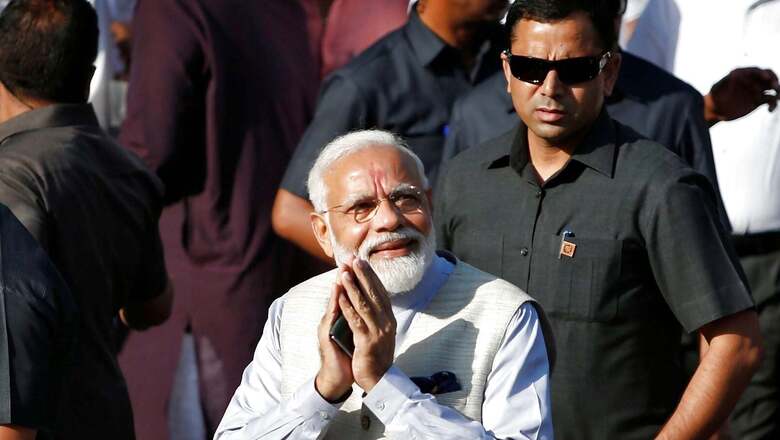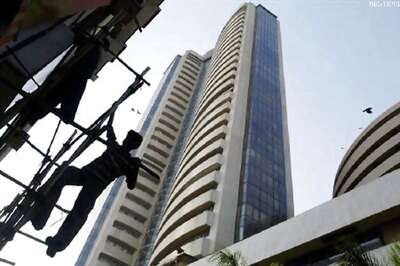
views
Twenty years is a long time in the life of a nation. For a politician with no pedigree to be able to influence and then curate the nation’s political narrative for this long is an exceptional, historic achievement. Only two other leaders have managed to do so in independent India—Jawaharlal Nehru and Indira Gandhi. While Nehru was favoured over Bose and Patel by Mahatma Gandhi, Indira Gandhi had the advantage of being Nehru’s daughter. Vajpayee, on the other hand, was active in central politics for the longest time but managed to dominate the narrative for a much shorter period. This is what makes Modi’s achievement rare and historic. Even as Gujarat CM, he enjoyed more coverage in the national media than PM Manmohan Singh. His transition from CM to PM was most effortless and natural, as if he had prepared all his life for the responsibility.
What makes Modi unique is that he has a brilliantly layered mind—a mind that can negotiate the challenges of the present while simultaneously looking out for opportunities of the future; a mind that can relentlessly pursue processes, without being bothered about end results; a mind that is conditioned to being stoic by nature.
ALSO READ | IBC and GST to Farm Laws and NEP, Narendra Modi is a Reformist Prime Minister
Being Pro-poor and Pro-business
In 1965, when Integral Humanism, a set of concepts drafted by Pandit Deen Dayal Upadhyaya, was adopted as an official doctrine of the Jana Sangh and later the BJP, nobody would have anticipated that the concept would bear fruition more than five decades later through PM Modi’s multi-directional approach.
PM Modi is unapologetically both pro-poor and pro-business at the same time.
In his own words, PM Modi explained his approach in a recent interview. “Why are pro-poor and pro-business mutually exclusive categories? Why should we divide policies into one or the other of these buckets? According to me, policymaking should be pro-people. By creating these artificial categories, you are missing out on interdependence in society. Business and people are not working with opposing objectives.”
If you actually analyse the policies of the Modi government, the broader agenda is very clear: redistribution of wealth to bridge the gap between the rich and poor. This is achieved by providing the same opportunities to every citizen across the country. Rural electrification, 100 per cent sanitation cover, Nal se Jal programme, fibre optic connectivity in villages among others, are all designed to provide a leve-playing field to people living in the remotest corners of the country. That drones are being used to ensure COVID-19 vaccines reach far flung villages is another remarkable equaliser.
By not subscribing to the age-old cliches of either being pro-poor or pro-business, PM Modi has created a new enabling paradigm for Pandit Deen Dayal Upadhyaya’s vision of Integral Humanism and Antoday to be realized.
Yahi Samay Hai, Sahi Samay Hai
During his interaction with Olympic medal winners recently, PM Modi had said something very interesting. He said, the saying “now or never” is outdated. This is the age when you should believe in “Yahi samay hai, sahi samay hai…” (This is the time, the best time). True to this, the key to Modi’s success has been to take challenges head on in the most adverse circumstances, instead of waiting for the crisis to settle down.
The best example of this is the slew of reforms that the government has unleashed right through the COVID crisis—be it labour reforms, telecom reforms, electricity sector reforms, the farm reforms (which unfortunately are on hold due to the andolanjeevis), setting up of Bad Bank to clear India’s NPA mess, scrapping of retrospective tax for corporates or putting into motion India’s National Monetisation Pipeline. All of these steps have created confidence in Indian markets. Record FDI inflows and the unstoppable bull run are valid indicators.
India’s deft and seamless vaccination programme enabled by CoWIN is another huge success story. The COVID crisis has consolidated our digital prowess globally. The PM’s ability to calmly sit through processes and be an innovative enabler has been a crucial catalyst in this success.
ALSO READ | The Modi Reset in Indian Politics: Not Caste or Religion but Winning on Governance
Do Your Karma
The PM has often said that a man who sows new seeds seldom bears the fruits but that should not prevent the person from sowing seeds and letting future generations benefit. Most of the reforms undertaken in the last year-and-half may not yield immediate results. But the slew of PLI manufacturing schemes initiated across sectors is bound to make India a manufacturing hub in the years to come.
One hopes and wishes that Prime Minister Modi continues his zeal for reforms for another decade to witness first-hand the biggest transformative results of his conviction and relentless labour.
The writer is an author and BJP spokesperson. The views expressed in this article are those of the author and do not represent the stand of this publication.
Read all the Latest News , Breaking News and IPL 2022 Live Updates here.


















Comments
0 comment